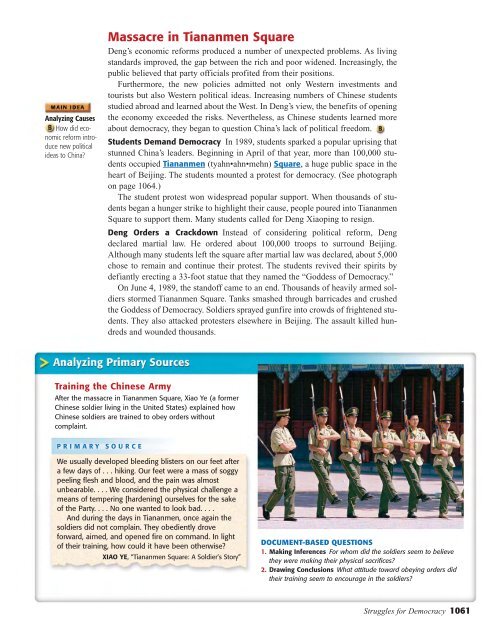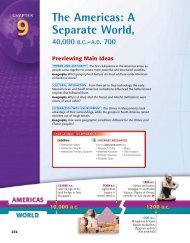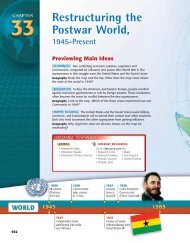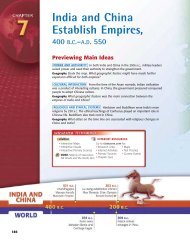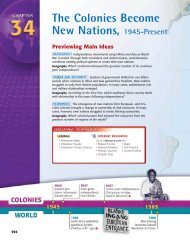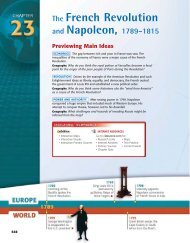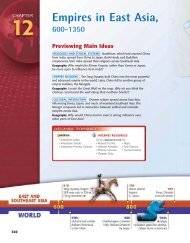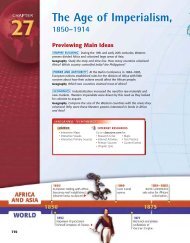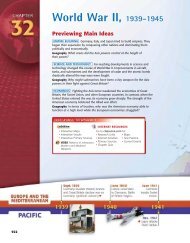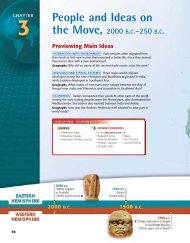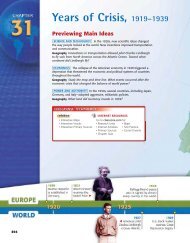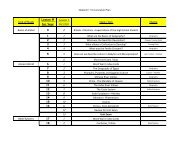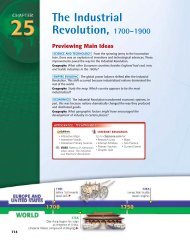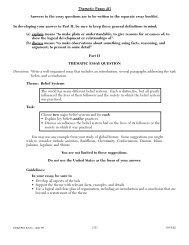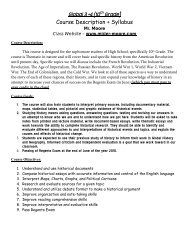Chapter 35 - First
Chapter 35 - First
Chapter 35 - First
Create successful ePaper yourself
Turn your PDF publications into a flip-book with our unique Google optimized e-Paper software.
Analyzing Causes<br />
How did economic<br />
reform introduce<br />
new political<br />
ideas to China?<br />
PRIMARY SOURCE<br />
Massacre in Tiananmen Square<br />
Deng’s economic reforms produced a number of unexpected problems. As living<br />
standards improved, the gap between the rich and poor widened. Increasingly, the<br />
public believed that party officials profited from their positions.<br />
Furthermore, the new policies admitted not only Western investments and<br />
tourists but also Western political ideas. Increasing numbers of Chinese students<br />
studied abroad and learned about the West. In Deng’s view, the benefits of opening<br />
the economy exceeded the risks. Nevertheless, as Chinese students learned more<br />
about democracy, they began to question China’s lack of political freedom.<br />
Students Demand Democracy In 1989, students sparked a popular uprising that<br />
stunned China’s leaders. Beginning in April of that year, more than 100,000 students<br />
occupied Tiananmen (tyahn•ahn•mehn) Square, a huge public space in the<br />
heart of Beijing. The students mounted a protest for democracy. (See photograph<br />
on page 1064.)<br />
The student protest won widespread popular support. When thousands of students<br />
began a hunger strike to highlight their cause, people poured into Tiananmen<br />
Square to support them. Many students called for Deng Xiaoping to resign.<br />
Deng Orders a Crackdown Instead of considering political reform, Deng<br />
declared martial law. He ordered about 100,000 troops to surround Beijing.<br />
Although many students left the square after martial law was declared, about 5,000<br />
chose to remain and continue their protest. The students revived their spirits by<br />
defiantly erecting a 33-foot statue that they named the “Goddess of Democracy.”<br />
On June 4, 1989, the standoff came to an end. Thousands of heavily armed soldiers<br />
stormed Tiananmen Square. Tanks smashed through barricades and crushed<br />
the Goddess of Democracy. Soldiers sprayed gunfire into crowds of frightened students.<br />
They also attacked protesters elsewhere in Beijing. The assault killed hundreds<br />
and wounded thousands.<br />
Training the Chinese Army<br />
After the massacre in Tiananmen Square, Xiao Ye (a former<br />
Chinese soldier living in the United States) explained how<br />
Chinese soldiers are trained to obey orders without<br />
complaint.<br />
We usually developed bleeding blisters on our feet after<br />
a few days of . . . hiking. Our feet were a mass of soggy<br />
peeling flesh and blood, and the pain was almost<br />
unbearable. . . . We considered the physical challenge a<br />
means of tempering [hardening] ourselves for the sake<br />
of the Party. . . . No one wanted to look bad. . . .<br />
And during the days in Tiananmen, once again the<br />
soldiers did not complain. They obediently drove<br />
forward, aimed, and opened fire on command. In light<br />
of their training, how could it have been otherwise?<br />
XIAO YE, “Tiananmen Square: A Soldier’s Story”<br />
DOCUMENT-BASED QUESTIONS<br />
1. Making Inferences For whom did the soldiers seem to believe<br />
they were making their physical sacrifices?<br />
2. Drawing Conclusions What attitude toward obeying orders did<br />
their training seem to encourage in the soldiers?<br />
Struggles for Democracy 1061


